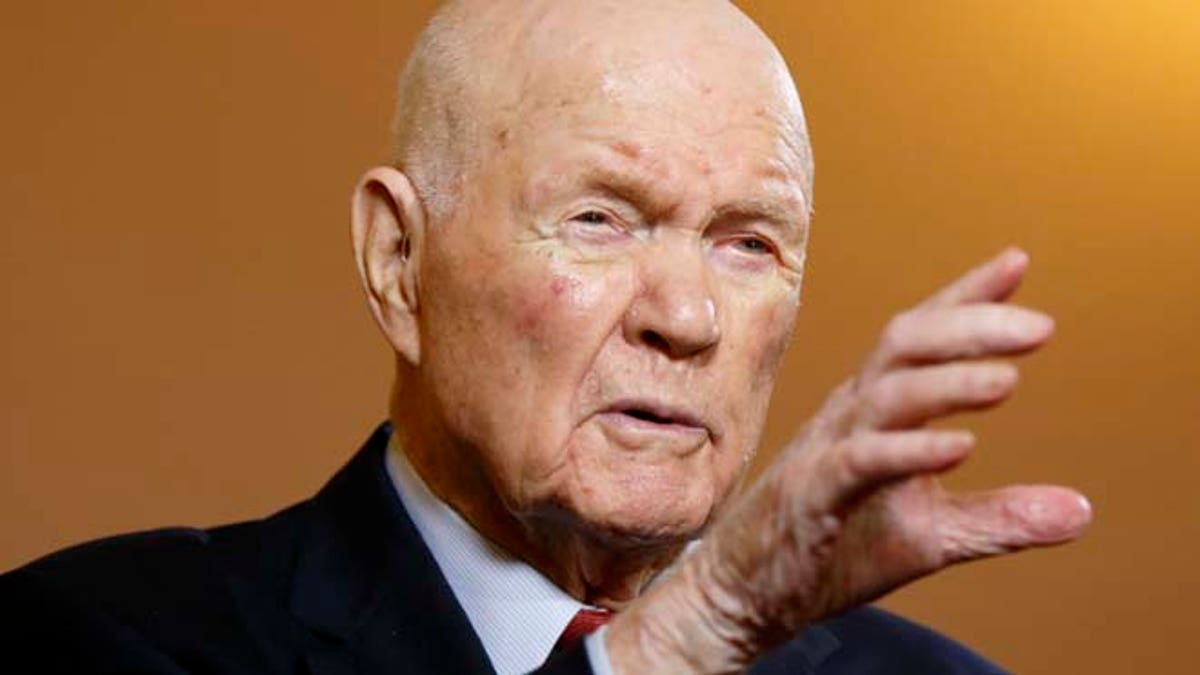
May 14, 2015: In this photo, former senator and astronaut John Glenn speaks during an exclusive interview with The Associated Press at the Ohio Statehouse, in Columbus, Ohio. (AP)
COLUMBUS, Ohio – John Glenn, who declared as a 77-year-old in a news conference from space that "to look out at this kind of creation out here and not believe in God is to me impossible," says facts about scientific discovery should be taught in schools -- and that includes evolution.
The astronaut, now 93 with fading eyesight and hearing, told The Associated Press in a recent interview that he sees no contradiction between believing in God and believing in evolution.
"I don't see that I'm any less religious by the fact that I can appreciate the fact that science just records that we change with evolution and time, and that's a fact," said Glenn, a Presbyterian. "It doesn't mean it's less wondrous and it doesn't mean that there can't be some power greater than any of us that has been behind and is behind whatever is going on."
Glenn -- the first American to orbit the Earth, a former U.S. senator, a onetime Democratic presidential candidate, flier of combat planes in two wars, and recipient of the Presidential Medal of Freedom -- ruminated on many other topics in the interview last week with the AP, including:
-- Possible reasons why he never got assigned to another space flight after orbiting Earth in Friendship 7 in 1962 (until his 1998 trip into space, that is).
Glenn said he was eager to get back into space after his 1962 flight and pestered Bob Gilruth, the director of NASA's Manned Spacecraft Center, every few weeks for a year and a half.
He didn't learn until decades later -- from reading Richard Reeves' biography of President John F. Kennedy -- that he had been intentionally grounded by NASA after his orbital flight, an event that generated intense excitement and public attention.
"Kennedy had indicated in that biography that he would just as soon that I was not assigned to another flight," Glenn said. "Now, whether it was because of the impact of if I got killed on the second flight would that reflect politically, I never knew. I never discussed that with anybody. All I knew was I never got reassigned to another flight."
-- He doesn't plan to stump for or endorse any candidates in 2016, despite past backing that has been pivotal to Democrats' efforts in Ohio. "That's in the past," said Glenn, who has weathered a year of health difficulties, including a small stroke after a 2014 heart-valve operation, and has lost half his vision and some hearing.
-- He and his wife, Annie, 95, will devote their energies to ramping up the John Glenn College of Public Affairs at Ohio State University. The growing college announced last week that it will manage Ohio's first-in-the-nation, state-specific social studies content for the website iCivics.
"This is not going to be a Republican college or a Democratic college. Quite the opposite of that," Glenn said. "It's going to be what we hope will be the best college of studies of government and policy of any place in the country."
-- He still disagrees strongly with the decision to dismantle the space shuttle program but is optimistic that humans will return to space through technology currently in development.
-- Of all his experiences, his military service in World War II and Korea stands out, including his plane being hit by fire. "Nothing compares to actual combat," he said.
-- His age: "I need all the godspeed I can get," Glenn joked about the famous line from 1962, spoken by fellow Mercury 7 astronaut Scott Carpenter. With Carpenter's death in 2013, Glenn became the last survivor of the famous team. He last saw Carpenter about a year before he died.
